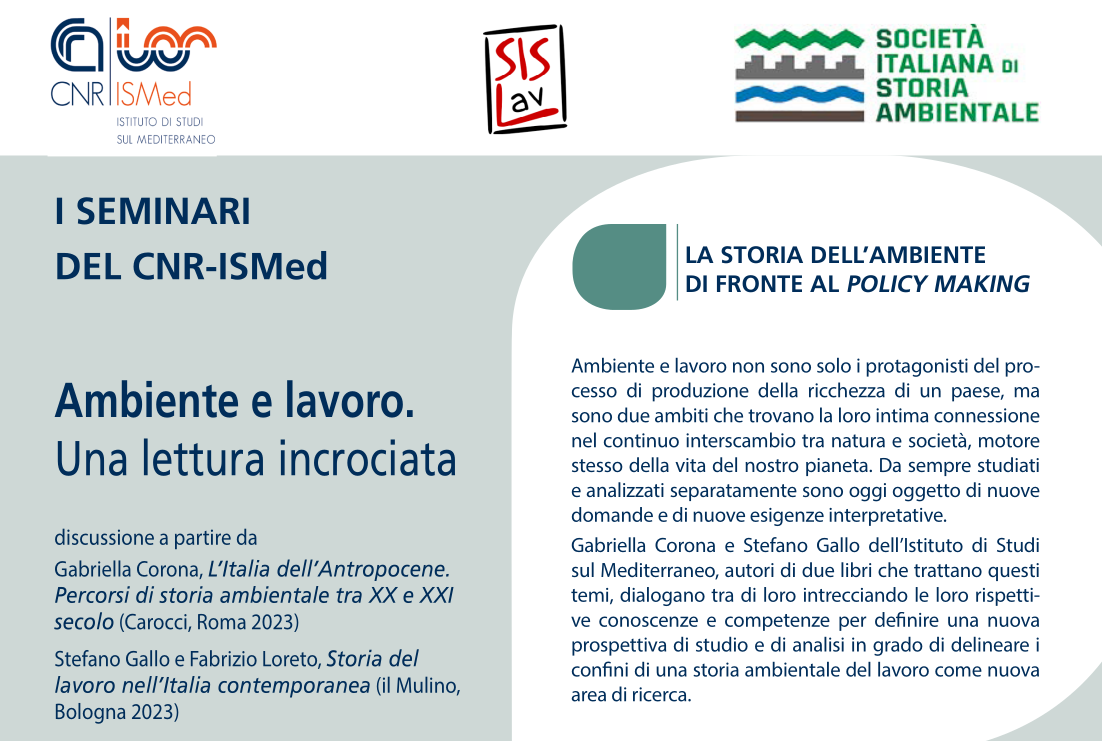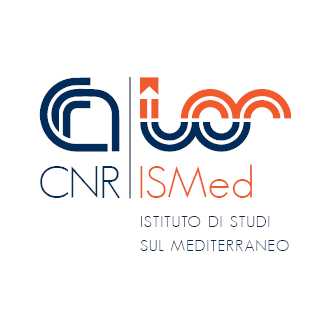Environment and work. A cross reading

Environment and work. A cross reading
INVITATION TO THE SEMINAR SERIES
THE HISTORY OF THE ENVIRONMENT IN THE CONTEXT OF POLICY MAKING
Environment and work.
A cross reading
discussion based on
Gabriella Corona, L’Italia dell’Antropocene.
Percorsi di storia ambientale tra XX e XXI secolo (Carocci, Rome 2023)
Stefano Gallo and Fabrizio Loreto,
Storia del lavoro nell’Italia contemporanea (il Mulino, Bologna 2023)
October 14, 2025, 10:00 a.m.
CNR-ISMed
Humanities Pole (6th floor)
Via Cardinale Guglielmo Sanfelice 8
Naples
REMOTE ACCESS
on the Teams platform
The environment and work are not only key players in the process of generating wealth in a country, but are also two areas that are closely connected through the continuous exchange between nature and society, the very driving force of life on our planet. Always studied and analysed separately, they are now the subject of new questions and new interpretative needs.
Gabriella Corona and Stefano Gallo of the Institute of Mediterranean Studies, authors of two books on these topics, engage in dialogue, combining their respective knowledge and expertise to define a new perspective for study and analysis capable of delineating the boundaries of an environmental history of work as a new area of research.
THE SPEAKERS. Gabriella Corona is the director of the Institute for Mediterranean Studies at the National Research Council (CNR) in Naples. She is editor in chief of the international journal Global Environment. “A Journal of Transdisciplinary History” and co-editor of “Meridiana. Journal of History and Social Sciences”. Her latest monographs are the following: Breve storia dell’ambiente in Italia (il Mulino, 2015), I ragazzi del piano. Napoli e le ragioni dell’ambientalismo urbano (Donzelli, 2007).
Stefano Gallo is a senior researcher at the Institute of Mediterranean Studies. He specialises in the social history of contemporary Italy, with research experience in archival sources and documents ranging from the late 19th century to the 1980s. His main fields of research are the history of migration and the history of labour. He teaches “History of Migration in the Contemporary Age” at the University of Pisa. Since 2021, he has been scientific director of the Franco Serantini Library – Historical Institute of the Resistance of the Province of Pisa.
PROGRAMME
SPEAKERS
Gabriella Corona
CNR-ISMed
Stefano Gallo
CNR-ISMed
INTRODUCES AND MODERATES
Alessandro Agosta
CNR-ISMed
University of Tuscia
FINAL DISCUSSION
SCIENTIFIC COMMITEE
Alessandro Agosta, Valerio Caruso, Gabriella Corona, Giovanni Ferrarese, Gabriella Rago
CNR-ISMed
INFO AND CONTACTS
valerio.caruso@ismed.cnr.it
www.ismed.cnr.it
www.storiaambientale.it
HOW TO PARTICIPATE
The seminar is open to the public, subject to availability.
It is possible to participate remotely via the Teams platform.
Last update
14 October 2025, 12:11

 CNR – ISMed
CNR – ISMed